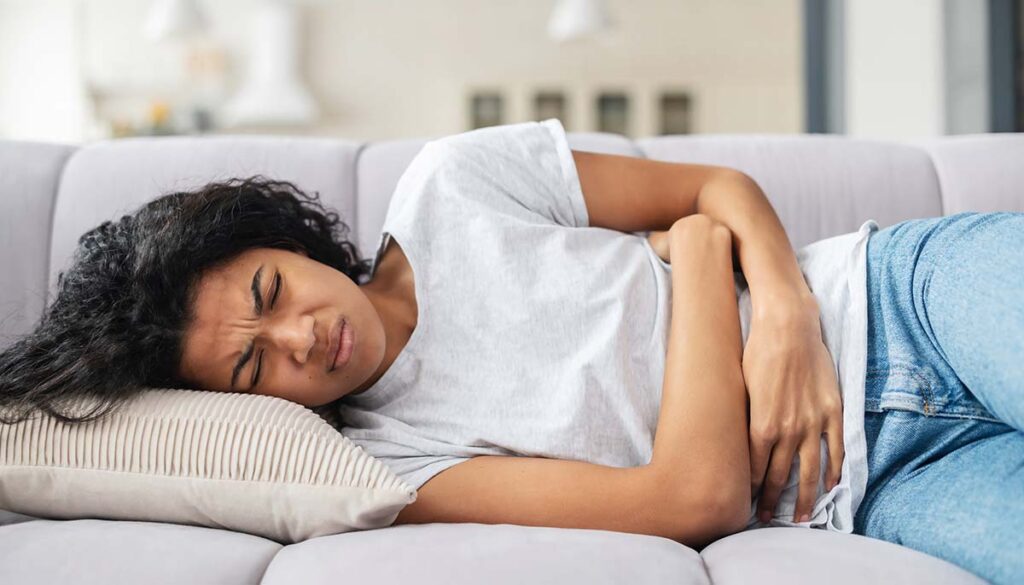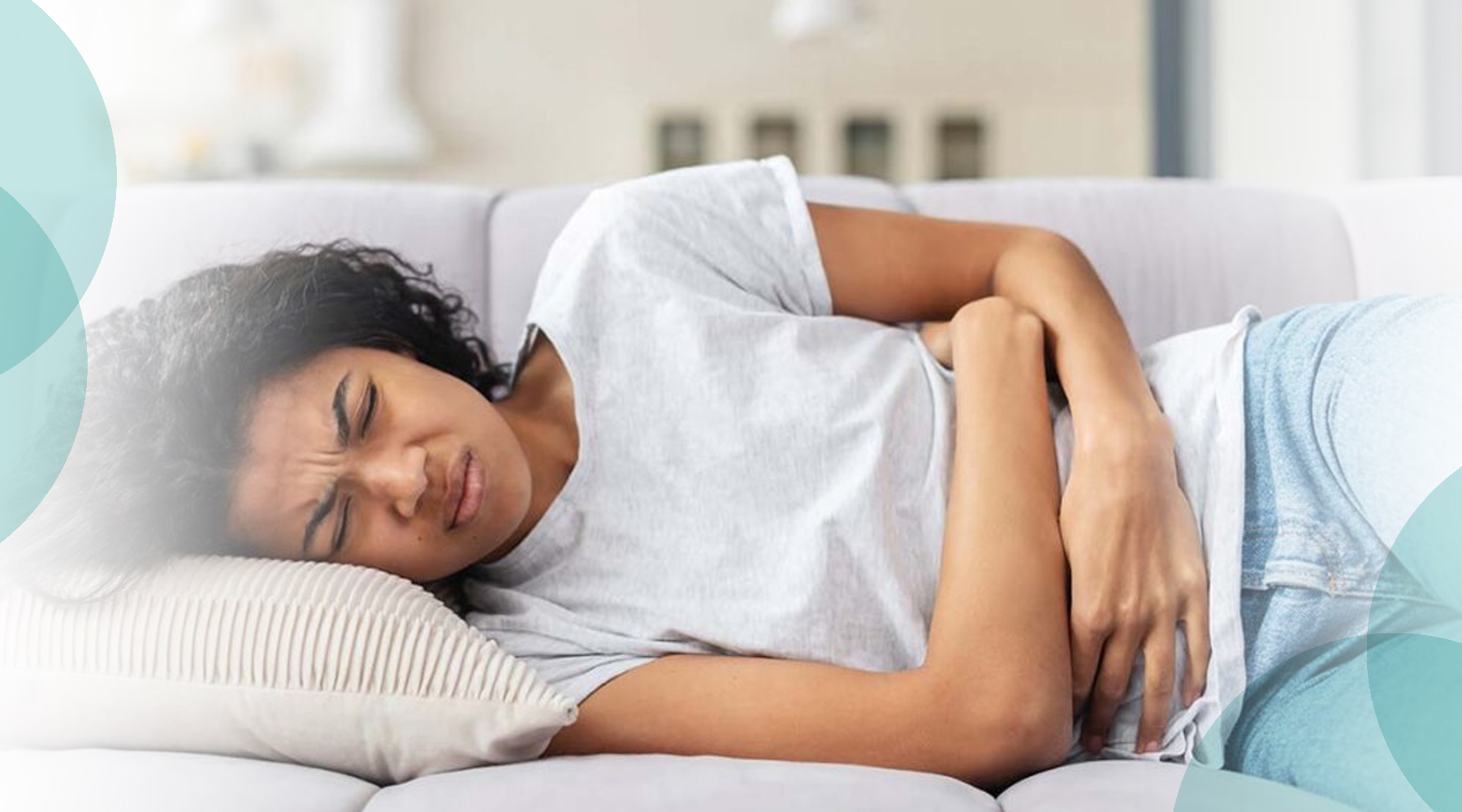Do you experience anxiety during your period?
It’s no mystery; periods can be completely debilitating. For days and even weeks before that time of the month, a plethora of PMS-related symptoms, ranging from things like emotional outbursts to crippling pain come back with vengeance like clockwork and in some cases, take over our lives. But remember, you’re the boss of you; not PMS.
There are a few scientifically noted reasons for this dreaded monthly shift. Thankfully, for every well-documented PMS-induced problem, there is often a much more simple solution than immediately meets the weepy eye. Anxiety may feel like the most unmanageable symptom you’re facing, especially while you’re in the thick of it. But don’t worry. There are ways to get a grip on anxiety and soften anxiety’s grip on you.
The first step is reminding yourself that you’re not alone. Chances are, what you’re experiencing is not remotely outside of the norm. And so, it’s time to show yourself (and your period) some much-needed kindness.
Here’s what to know about anxiety-induced PMS and some expert-approved ways to get some real relief.
Why Anxiety Increases During Your Period
Does your anxiety always seem to spike right before or during your period? If so, it shouldn’t be treated like a recurring coincidence. It also shouldn’t be dismissed.
Around that time of the month, our brain chemistry changes due to a shift in our hormonal balance and an increase in certain hormones. Depending on our emotional, psychological, and physical health going in, some of these shifts are more dramatic than others.

Due to the formative presence of hormones like estrogen and progesterone, women are already significantly more at risk than men to suffer from anxiety disorders, depression, and panic attacks, according to medical experts.
Typically, hormone-related issues are most pronounced during one’s periods. And it makes sense when you think about it. Hormones impact and regulate our overall well-being and modes of operating. During PMS, we suffer from sudden hormonal fluctuations. This interrupts the delicate balance of our physical and mental health, triggering increased anxiety for many.
Common symptoms of PMS include mood swings, anxiety, depression, sleep disturbances, fatigue, crying spells, anger, and feelings of worthlessness. For most, familiar changes with the body, mental state, and emotional responses serve as an alert that a period is nearing. And the better prepared you are for yours, the better you’ll be able to deal with the anxiety that often comes along with it.
Dealing With PMS-related Anxiety
No matter how bad your PMS-induced anxiety might be, there are two things you can immediately do to improve some of the symptoms. Since how we treat ourselves greatly affects how we respond to stressors, experts recommend “overhauling” your diet and lifestyle choices for good measure.
When dealing with PMS-related anxiety, or any anxiety for that matter, always start with your diet. Consider getting on an anti-inflammatory diet that’s rich in fruit and vegetables, but low in animal products. Science has shown this can greatly diminish the effects of anxiety. Complex carbs, calcium, and B vitamins have also been shown to help with physical, psychological, and PMS-related problems in general.
Around the time of your period, it’s also advised that you stay away from caffeine and alcohol, which can significantly heighten depression and anxiety. Furthermore, giving in to every food impulse or anxious thought you’re having might not be in your best interest when you’re not feeling your best. So when you get the urge to cope through less than healthy means, take a moment to assess how you’re feeling, how you’d like to feel, and if chugging a liter of Dr. Pepper may ultimately do more harm than good.

While it might be tempting to do nothing productive during a time like this, staying active is crucial for your health. Even if you need to curl up on the couch, watch a movie, and have a good cry, be sure to make time for exercise and mindfulness practices too. Go for walks, do yoga, and keep things light. Involve meditation to find balance, quiet your mind, and calm your system.
And never underestimate the power of a good night’s sleep.
The Truth About Birth Control
If you experience anxiety during your period, some doctors suggest coming off the pill and finding a more hormone-friendly alternative. For one thing, testosterone is very important for women and too often dismissed as something more important for men. In reality, testosterone is very important for regulating mood and boosting confidence. Like estrogen, its positive effects can be diminished by oral contraceptives. So if you are dealing with severe emotional ups and downs during your period, it might be time to see what else is out there.
Many doctors note that when their patients stop taking the pill, estrogen and testosterone levels go back up. With that healthy hormonal upturn, anxiety and other unsavory symptoms—like low self-esteem—tend to drop. Regulating your body’s hormonal state can have a positive impact on your PMS-related anxiety. Talk to your doctor about natural dietary supplements that combat anxiety, promote better sleeping patterns, and improve digestion. You’ll likely be surprised by how much better you can feel with a few natural tweaks.
Read More: 11 Natural Remedies For Anxiety
Preventing Anxiety, Proactively and Consistently
The truth is, completely eradicating anxiety from your system may not be realistic. But there are ways to better prepare for it, making significant relief possible. Ultimately, anxiety relief may very well start with prevention.
Again, a change to your lifestyle habits can lead to a major improvement in any and all symptoms you deal with during your menstrual cycle. So start with one of the places you have the most control. In other words, it’s time to cultivate healthy habits outside of your cycle with your cycle in mind.

Here are some dietitian-approved quick tips for preparing for your next period.
- Drink more water than usual. Dieticians recommend two to three liters a day. Also, try adding ginger to hot water and lemon when your drinking it cool. Both tricks can bring relief when done consistently.
- Stay hydrated with water-based foods as well. This means eat your fruits and veggies. Some of the best for hydration include strawberries, blueberries, celery, cucumber, greens, and watermelon.
- Include fish, chicken, and complex carbohydrates such as whole grains and brown rice with your meals.
- Make sure you’re getting enough calcium, vitamin E, D, thiamine, magnesium, and plenty of omega-3 fish oil.
- Focus on your gult health (with yogurt) and eat natural diuretics, such as celery, cucumbers, tomatoes, asparagus, garlic, melon, and lettuce.
- Make green tea a part of your daily routine
- Exercise for 30 minutes a day, at least three days a week.
- Stay away from alcohol and limit your caffeine intake.
- Rev up your calcium-rich food or supplement intake to ease your cramps.
- Drink warm or hot water to calm and soothe your uterine muscles.
Read More: Eat These Foods to Help Ease Depression and Anxiety
When to See Your Doctor
If symptoms like anxiety, depression, and irritability seemingly vanish once your period actually starts, then they were likely a typical part of PMS and probably nothing more.
However, if PMS-induced anxiety disrupts your life, it’s always worth talking to someone about it. Not to mention, you might be dealing with something more serious that’s being left unaddressed.

If the drastic emotional changes linger, even lasting far beyond your period, you may be dealing with an underlying medical and/or psychological issue known as premenstrual dysphoric disorder (PMDD). It’s often seen as a super-PMS, but there is nothing super about it.
This condition is much more severe than your average PMS. It’s marked by significant emotional shifts—such as anxiety, depression, irritability, and even suicidal thoughts. For some, PMDD is a disruptive force that makes it borderline impossible to function. The good news is, it can be treated.
Here’s a comprehensive guide to PMDD and how to start coping today, compliments of Healthline.
Feeling Better
Aside from medications, there’s no quick fix for anxiety. That’s why it’s so important to implement healthy changes outside of your period so that when it comes back without fail, you’ll be in a better place to deal with all that comes with it. You may never be your easiest, breeziest self at this stage of your cycle, but you can make life more livable with some much-needed TLC.
In many cases, a history of depression, anxiety, panic disorders, PTSD, and/or other mental health issues can be exacerbated during typical PMS. If you are prone to irritability, paranoia, mood swings, depression, self-doubt, or general feelings of anxiety, you likely notice the things you struggle with regularly are most prominent and unavoidable around the time of your period.
Also, certain mental illnesses and current life struggles can make common PMS issues that much more difficult to manage. But no matter what you’re dealing with or how long it’s been going on, you shouldn’t have to go through it alone.

Whether you suffer from typical PMS, PMDD, or something else that has been ailing you altogether, you should never feel ashamed about seeking any form of help if your anxiety seems beyond your control. After all, the first step to feeling better is addressing the problem. And there’s no shame in talking to a professional. A well-versed, objective party can help you find ways to cope when you’ve reached a point where you no longer know how to.
Ultimately, taking care of yourself at all times is key. Once you identify your anxiety triggers, your recurring PMS symptoms, and which self-soothing skills could use some fine-tuning, you’ll start feeling better, one consistently healthy habit at a time. And no matter how hard it might be, find ways to relax. Take a deep breath and remind yourself that this too shall pass. All of your good, bad, and ugliest moods will shift into another phase and no feeling is permanent. After all, your period won’t last forever. But it will be back. So act accordingly.













